
hill_l_a_elementary_stories_for_reproduction_2
.pdf
B. Do this puzzle.
Across:
2. The doctor sent Mrs. Jenkins. . . for £2.
4. Mrs. Jenkins never drank tea or . . . .
6.The doctor said, ‘. . . , then stop eating fried potatoes.’ (two words)
7.Not I, not you, and not anyone else.
8.Mrs. Jenkins said, ‘I . . . fried potatoes.’
9.I’ve never smoked. I don't like . . . .
Down:
1.Mrs. Jenkins liked fried . . .
very much.
2.This is the opposite of ‘stop’.
3.A man burned his finger while he was . . . a ciga-
rette with a match.
5. Mrs. Jenkins never drank this.
C. Write this story. Choose the correct words (to . . . or -ing):
|
When Helen finished to work in Iran, she came back to England |
|
|||||
|
|
|
working |
|
|
|
|
to work |
|
|
to teach |
her |
|
||
|
in a bank. She wanted a car, so I offered to |
|
|
|
|||
working |
|
|
teaching |
|
|
||
to drive |
to learn |
|
to drive |
well, |
|||
|
. She enjoyed |
|
very much, and she learned |
|
|
||
driving |
learning |
|
driving |
|
|||
very quickly. Of course, she sometimes forgot to put |
her hand out when |
||||||
|
|
|
putting |
|
|
|
|
she wanted to turn , |
and she did not always remember to get |
petrol |
|||||
|
turning |
|
|
getting |
|
||
to make
when she needed it, but she soon stopped mistakes, and when she
making
to take
went her test*, she passed easily.
taking
Word outside the 1000: puzzle – *A kind of examination.
33
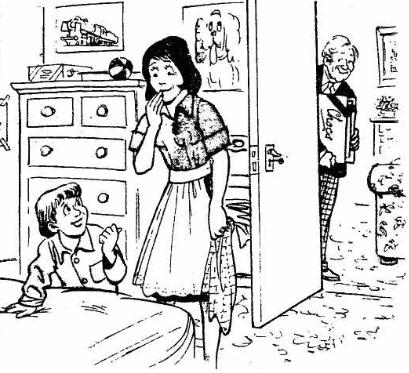
16
John liked chocolates very much, but his mother never gave him any, because they were bad for his teeth, she thought. But John had a very nice grandfather. The old man loved his grandson very much, and sometimes he brought John chocolates when he came to visit him. Then his mother let him eat them, because she wanted to make the old man happy.
One evening, a few days before John’s seventh birthday, he was saying his prayers in his bedroom before he went to bed. ‘Please, God, he shouted,’ make them give me a big box of chocolates for my birthday on Saturday.’
His mother was in the kitchen, but she heard the small boy shouting and went into his bedroom quickly.
‘Why are you shouting, John?’ she asked her son. ‘God can hear you when you talk quietly.’
‘I know,’ answered the clever boy with a smile, ‘but Grandfather’s in the next room, and he can’t.’
Word outside the 1000: prayer
34
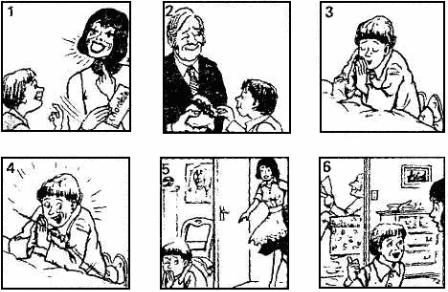
A.Answer these questions.
1.Why didn’t John get any chocolates from his mother?
2.Why did his grandfather give him chocolates?
3.Who did John really mean when he said ‘them’ while he was saying his prayers?
4.Why did John’s mother go into his bedroom quickly?
5.What did John want his grandfather to do on Saturday?
B.Opposites. What words in the story on page 34 mean the opposite of:
1. |
good |
4. always |
7. stupid |
2. |
small |
5. hated |
|
3. |
loudly |
6. slowly |
|
C. Put the number of the correct sentence under the correct picture.
1.John said his prayers.
2.His mother ran into his bedroom.
3.John’s mother did not want to spoil his teeth.
4.John’s grandfather gave him some chocolates.
5.He shouted loudly.
6.John smiled and said, ‘Grandfather can’t hear me well.’
35
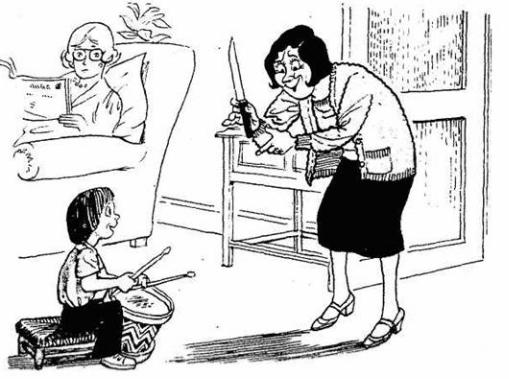
17
It was Jimmy’s birthday, and he was five years old. He got quite a lot of nice birthday presents from his family, and one of them was a beautiful big drum.
‘Who gave him that thing?’ Jimmy’s father said when he saw it. ‘His grandfather did,’ answered Jimmy’s mother.
‘Oh,’ said his father.
Of course, Jimmy liked his drum very much. He made a terrible noise with it, but his mother did not mind. His father was working during the day, and Jimmy was in bed when he got home in the evening, so he did not hear the noise.
But one of the neighbours did not like the noise at all, so one morning a few days later, she took a sharp knife and went to Jimmy’s house while he was hitting his drum. She said to him, ‘Hullo, Jimmy. Do you know, there’s something very nice inside your drum. Here’s a knife. Open the drum and let’s find it.’
Word outside the 1000: drum
36
A.Answer these questions.
1.When did Jimmy get the drum?
2.Whom did he get it from?
3.Why didn't his father hear it?
4.Why did the neighbour really want Jimmy to cut the drum open?
5.What did she say to Jimmy to make him cut it open?
B.Write these sentences. Put one of these in each empty place:
a lot |
a lot of |
many |
much |
‘How . . . did Jimmy’s drum cost?’
‘Oh, it didn’t cost . . . ; but his toy horse cost quite . . . .’ ‘How . . . other birthday presents did he get?’
‘He got quite . . . nice things.’ ‘Did he get . . . other toys?’
‘Oh, yes, he got quite . . . . And he got . . . chocolate, but not . . . sweets.’ ‘Did he get . . . chocolate from his parents?’
‘No, he didn’t get any from them.’
C.Which of the answers to these questions are right? Write the correct ones down:
1.Who gave Jimmy the drum?
a.His father.
b.His grandfather.
c.His mother.
2.Why did Jimmy’s father not stop him making a noise with the drum?
a.Because he didn’t mind.
b.Because he wasn’t at home then.
c.Because Jimmy only played it in the evening.
3.What did Jimmy’s neighbour really want him to do?
a.To spoil his drum.
b.To find something nice in his drum.
c.To make a noise on his drum with a knife.
37
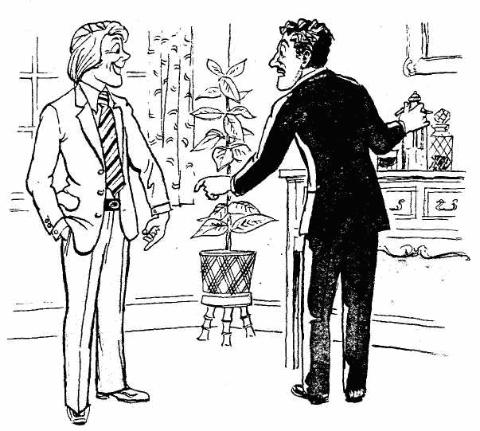
18
When Torn Howard was seventeen years old he was as tall as his father, so he began to borrow Mr. Howard’s clothes when he wanted to go out with his friends in the evening.
Mr. Howard did not like this, and he always got very angry when he found his son wearing any of his things.
One evening when Tom came downstairs to go out, his father stopped him in the hall. He looked at Tom’s clothes very carefully.
Then he said angrily, ‘Isn’t that one of my ties, Tom?’ ‘Yes, Father, it is,’ answered Tom.
‘And that shirt’s mine too, isn’t it?’ his father continued. ‘Yes, that’s yours too,’ answered Tom.
‘And you’re wearing my belt!’ said Mr. Howard.
‘Yes, I am, Father,’ answered Tom. ‘You don’t want your trousers to fall down, do you?’
Word outside the 1000: tie (n.)
38

A.Answer these questions.
1.When did Tom begin to borrow his father’s clothes?
2.When did he put them on?
3.What did Tom’s father do when he borrowed his clothes?
4.Which of his father’s clothes was Tom wearing in this story?
B.Opposites. Write these sentences. Put one word in each empty place.
1.Tom was not a . . . boy. He was a tall boy.
2.Mr. Howard was not . . . when Tom borrowed his clothes: he was angry.
3.Mr. Howard did not . . . his clothes to Tom; but Tom borrowed them.
4.Tom didn't borrow his father’s oldest clothes. He borrowed his . . . ones.
5.Tom did not want his father’s trousers to fall down: he wanted them to . . . .
C.Choose the right sentence for each picture. Write it down.
1.a. Joe is as tall as his father.
b.Joe is less tall than his father.
c.Joe is taller than his father.
2.a. Tom is going upstairs.
b.Tom is coming upstairs.
c.Tom is coming downstairs.
3.a. Tom is wearing a belt.
b.Tom isn’t wearing a belt.
c.Tom’s belt has broken.
39
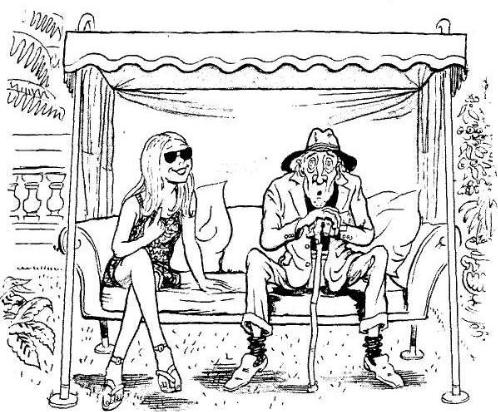
19
Mr. Yates was nearly ninety, so it was often difficult for him to remember things, but he still liked travelling very much, so he and his wife went to Spain every year. One summer when they were there, they went to visit some friends. These people had two young daughters.
One afternoon Mr. Yates was talking to one of the girls in the garden after lunch. ‘You and your sister were ill when my wife and I were here last year, weren’t you?’ he said to her.
‘Yes, we were,’ answered the girl. ‘We were very ill.’
The old man said nothing for a minute, because he was thinking. Then at last he said, ‘Oh, yes, I remember now! One of you died. Which one of you was it, you or your sister?’
The girl answered, ‘It was me.’
‘Oh? I’m very sorry to hear it,’ said the old man.
40
A.Answer these questions.
1.Why did Mr. Yates not remember things very well?
2.Where did his friends live?
3.Who were ill when Mr. and Mrs. Yates visited Spain another time?
4.Who really died then?
5.Was the girl having a joke with Mr. Yates?
B.Which words in the story on page 40 mean:
1. |
almost |
3. sad |
5. stopped living |
2. |
not forget |
4. hard |
|
C.Write this story. Put one word in each empty place. You will find all the correct words in the story on page 40.
Mr. and Mrs. Yates lived together for 52 years, and then she became very
. . . . After a month she . . . , and Mr. Yates was alone. It was . . . for him to live in a big house without anybody else, so he married again. His new . . .
was much younger than he was, and she liked . . . to foreign countries, so they began to go to Africa every . . . , in the winter. Mrs. Yates had a younger
. . . , and she usually went with them too. Everybody thought, ‘Those girls are that old man’s . . . .’
One day in Kenya a man said to him, ‘Do you . . . me? I was your neighbour in Southampton.’
Mr. Yates did not answer for a few seconds, because he was . . . . Then he said, ‘Oh, yes! That’s right! I married your daughter, didn’t I?’
41
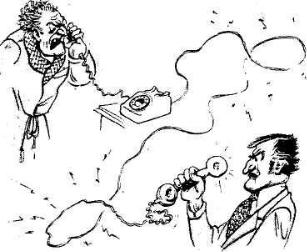
20
Mr. Knott was a teacher. He taught in a big school in London. He lived a long way from the school, so he was usually quite tired when he got home. At nine o’clock one evening, when he was in bed, the telephone bell rang in the hall of his small house, so he went downstairs, picked up the telephone and said, ‘This is Whitebridge 3165. Who’s speaking, please?’
‘Watt,’ a man answered.
‘What’s your name, please?’ said Mr. Knott. ‘Watt’s my name,’ was the answer.
‘Yes, I asked you that. What’s your name?’ Mr. Knott said again.
‘I told you. Watt’s my name,’ said the other man. ‘Are you Jack Smith?’ ‘No, I’m Knott,’ answered Mr. Knott.
‘Will you give me your name, please?’ said Mr. Watt. ‘Will Knott,’ answered Mr. Knott.
Both Mr. Watt and Mr. Will Knott put their telephones down angrily and thought, ‘That was a rude, stupid man!’
A.Answer these questions.
1.Why was Mr. Knott usually tired in the evenings?
2.Why did he get up and go downstairs when he was already in bed?
3.Who telephoned him?
Word outside the 1000: rude
42
